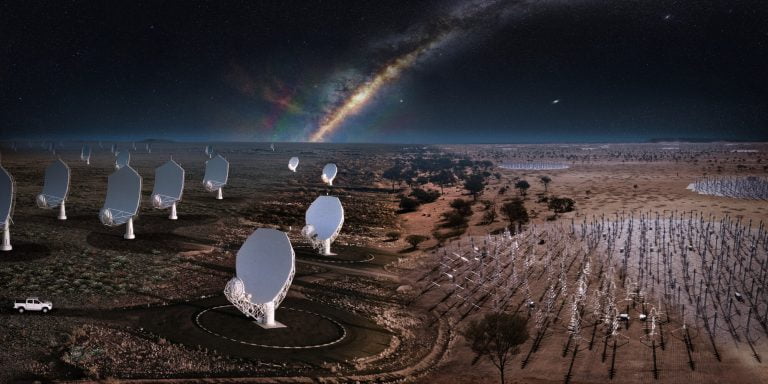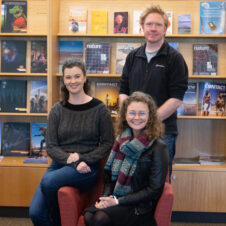SKAO Global Headquarters, Jodrell Bank, UK
The SKA Observatory, a new intergovernmental organisation dedicated to radio astronomy, was launched today following the first meeting of the Observatory’s Council.
The new Observatory, known as SKAO, is the world’s second intergovernmental organisation to be dedicated to astronomy. Headquartered in the UK on the grounds of the Jodrell Bank UNESCO World Heritage Site with sites in Australia and South Africa, SKAO is tasked with building and operating the two largest and most complex radio telescope networks ever conceived to address fundamental questions about our universe.
“This is a historic moment for radio astronomy,” said Dr Catherine Cesarsky, appointed first Chair of the SKAO Council. “Behind today’s milestone, there are countries that had the vision to get deeply involved because they saw the wider benefits their participation in SKAO could bring to build an ecosystem of science and technology involving fundamental research, computing, engineering, and skills for the next generation, which are essential in a 21st century digital economy.”
SKAO’s telescope in South Africa will be composed of 197 15 metre-diameter dishes located in the Karoo region, 64 of which already exist and are operated by the South African Radio Astronomy Observatory (SARAO), while the telescope in Australia will be composed of 131,072 two-metre-tall antennas located on the Commonwealth Scientific and Industrial Research Organisation’s (CSIRO) Murchison Radio-astronomy Observatory.
The creation of SKAO follows a decade of detailed engineering design work, scientific prioritisation, and policy development under the supervision of its predecessor the SKA Organisation, supported by more than 500 engineers, over 1,000 scientists and dozens of policy-makers in more than 20 countries; and is the result of 30 years of thinking and research and development since discussions first took place about developing a next-generation radio telescope.
“Today marks the birth of a new Observatory,” said Prof. Philip Diamond, appointed first Director-General of SKAO. “And not just any observatory – this is one of the mega-science facilities of the 21st century. It is the culmination of many years of work and I wish to congratulate everyone in the SKA community and in our partner governments and institutions who have worked so hard to make this happen. For our community, this is about participating in one of the great scientific adventures of the coming decades. It is about skills, technology, innovation, industrial return, and spin offs but fundamentally it is about a wonderful scientific journey that we are now embarking on.”
The first SKAO Council meeting follows the signature of the SKA treaty, formally known as the Convention establishing the SKA Observatory, on 12 March 2019 in Rome, and its subsequent ratification by Australia, Italy, the Netherlands, Portugal, South Africa and the United Kingdom and entry into force on 15 January 2021, marking the official birth date of the observatory.
The Council is composed of representatives from the Observatory’s Member States, as well as Observer countries aspiring to join SKAO. Among these are countries that took part in the design phase of the SKA such as Canada, China, France, Germany, India, Spain, Sweden and Switzerland, and whose future accession to SKAO is expected in the coming weeks and months, once their national processes have been completed. Representatives of national bodies in Japan and South Korea complement the select list of Observers in the SKAO Council.
At its first meeting, the SKAO Council approved policies and procedures that have been prepared in recent months – covering governance, funding, programmatic and HR matters, among others. These approvals are required to transfer staff and assets from the SKA Organisation to the Observatory and allow the latter to become a functioning entity.
“The coming months will keep us very busy, with hopefully new countries formalising their accession to SKAO and the expected key decision of the SKAO Council giving us green light to start the construction of the telescopes,” added Prof. Diamond.
SKAO will begin recruitment in Australia and South Africa in the next few months, working alongside local partners CSIRO and SARAO to supervise construction, which is expected to last eight years, with early science opportunities starting in the mid 2020s.
The Hon Karen Andrews, Minister for Science and Technology, says “Australia is delighted to be a founding member of the SKA Observatory. The Observatory will be a world leader in radio astronomy discovery for decades to come, bringing with it new technologies, human capital development and inspiration for future generations. Establishing the SKA Observatory is the culmination of many years of work and Australia greatly values the strong partnerships forged with fellow member countries during this time.”

Nighttime composite image of the SKA combining all elements in South Africa and Australia. Credit: SKAO, ICRAR, SARAO / Acknowledgment: The GLEAM view of the centre of the Milky Way, in radio colour. Credit: Natasha Hurley-Walker (Curtin / ICRAR) and the GLEAM Team.
About SKAO
SKAO, formally known as the SKA Observatory, is a global collaboration of Member States to build and operate cutting-edge radio telescopes to answer fundamental questions about our Universe. Headquartered in the UK, its first two telescopes, the two largest and most complex radio telescope networks ever built, will be constructed in Australia and South Africa. A later expansion is envisioned in both countries and other African partner countries. SKAO’s telescopes will conduct transformational science and, together with other state-of-the-art research facilities, address gaps in our understanding of the Universe including the formation and evolution of galaxies, fundamental physics in extreme environments and the origins of life. Through the development of innovative technologies and its contribution to addressing global societal challenges, SKAO will play its part to address the United Nations’ Sustainable Development Goals and deliver significant non-science impact across its membership and beyond. Current SKAO Members are Australia, Italy, the Netherlands, Portugal, South Africa and the United Kingdom with several other countries aspiring to membership or engagement with SKAO in the future.
Additional resources
Media Contact:
William Garnier — Director of Communications, Outreach & Education, SKA Organisation
Ph: +44 7814908932 E: w.garnier@skatelescope.org

